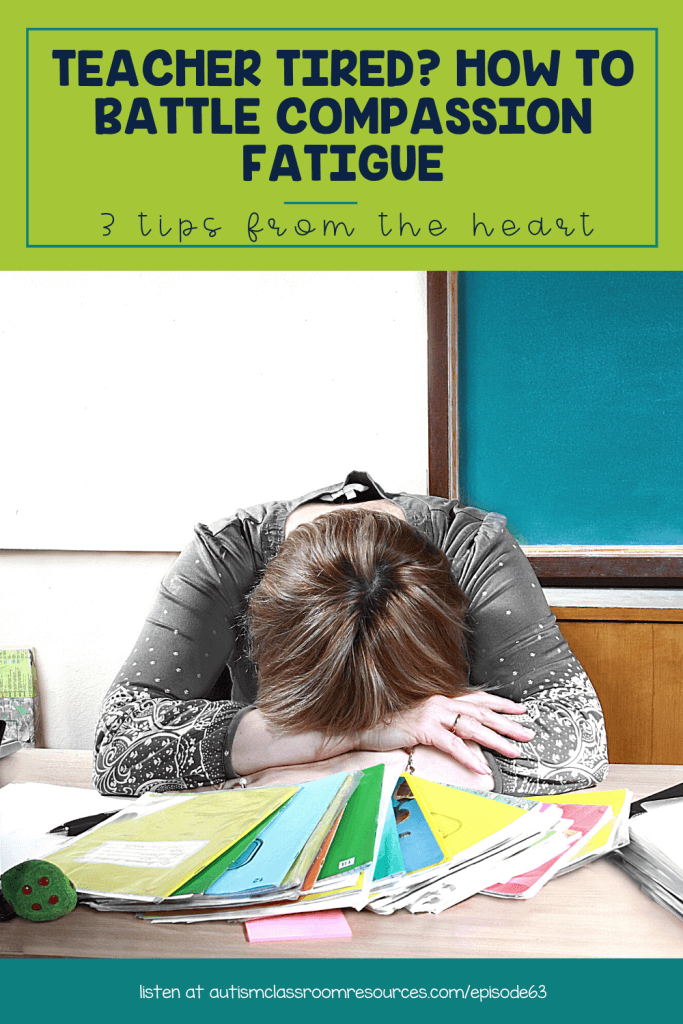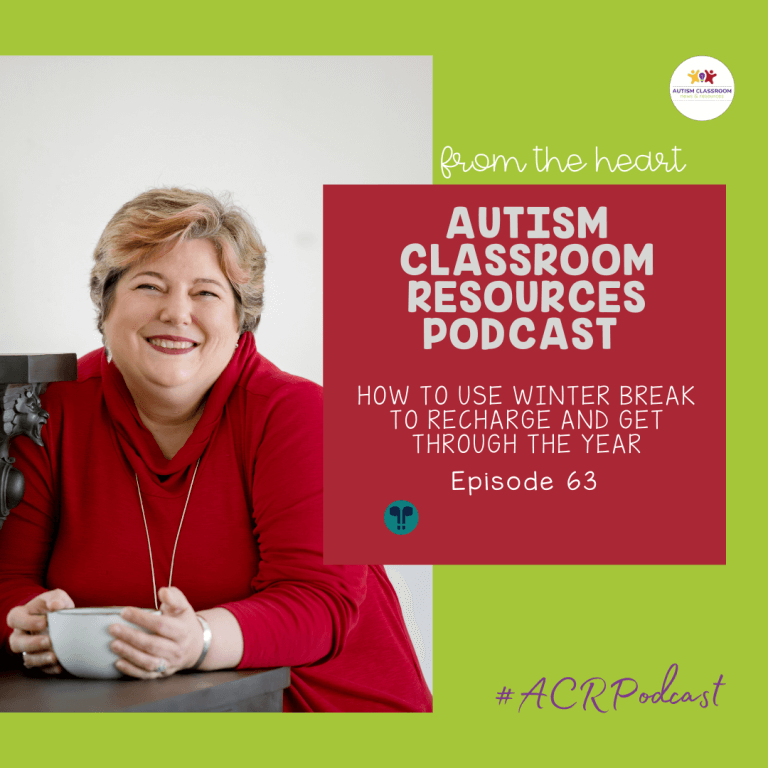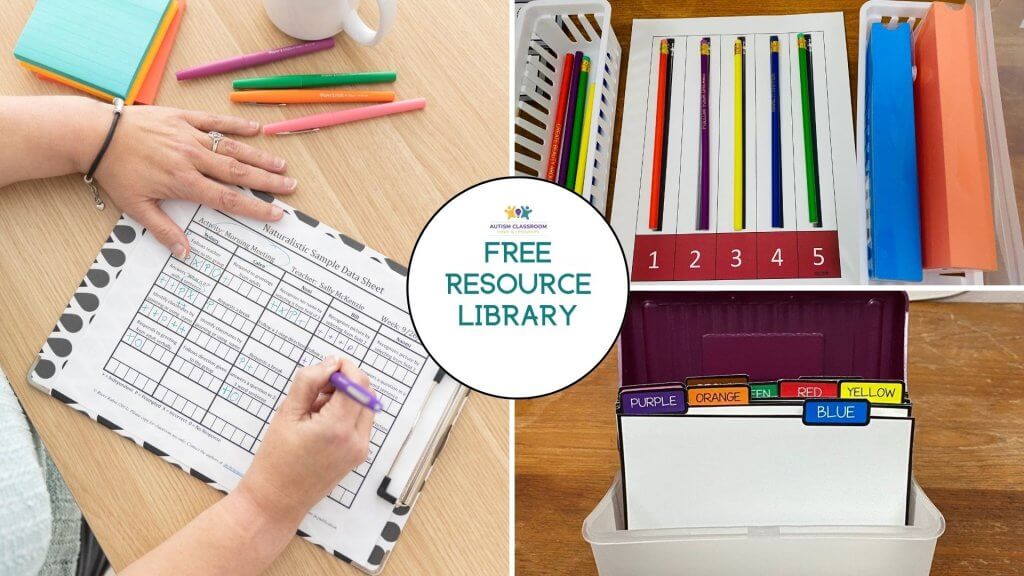Coping with Compassion Fatigue
In addition, we are coping with compassion fatigue. Compassion fatigue is real. Yep, it’s a real phenomenon among caregivers….like teachers. It’s different than burnout, which is caused by stress and is real enough in our field. It’s the emotional toll that caring for our students and families takes on us as well as the trauma we take on from caring for them. And this year the stress, the trauma and the emotional toll is all higher in and out of the classroom.
Highlights of Episode 63: Teacher Tired
So, this episode really is more of an episode from the heart of a lessons I learned about compassion fatigue and having to adjust expectations to manage to get through. These are specific lessons that I’ve adapted to our current situation.
I wrote a post about them and you can read all the gory details here if you want. But that year taught me a lot. (Isn’t that one of the most frustrating things about stress….you learn things!). I’m also going to share some resources that might be helpful if you are looking for more strategies to help you move forward.
And then, the podcast (and I) are going to take a two-week hiatus over the break. I need to practice what I preach and rest my brain. And I need to do some planning for the coming year to bring you more content.
Lessons From the Heart on Compassion Fatigue
These are lessons I learned when my Mom was battling Parkinsons at the end of her life and my sister was battling respiratory issues. And they were lifelong issues of learning for me. I’m fortunate because I’ve had a very supportive family who are a big part of my life but that meant that I needed to be there for them as they have always been there for me. You can read more about this journey in this post. But these are a couple of elements I want to highlight that I think are relevant to our current situation.
Reframe Your Thinking to Prevent Burnout
For me to prevent burnout, this is the biggest element. And there is some good research that supports that optimistic thinking leads to more positive outcomes than pessimistic thinking. That doesn’t mean that you have to look at everything and think it’s going to all be unicorns and four-leaf clovers. Instead, it means that you look at situations and find the good parts of them. While this is a premise my mother always taught me, it’s also something I was taught in grad school. It’s a focus of cognitive-behavioral psychology for addressing depression. And it’s got good research behind it.
Personally, when my mom started to decline I was really stressed and frustrated. I was worried about the time it was taking away from my work. And I was worried about how she was doing. Once I started to accept that this was a fact of her life and viewed it as an opportunity to treasure the time I had left with her, I enjoyed my time with her much more. And my stress significantly decreased.
Reframe Expectations to Address Teacher Tired
So, if you are teacher tired, lessen your demands and reframe your expectations. Take time this break to spend more time with your immediate family. Maybe you aren’t traveling or having family come to you as you usually do and the holidays will be different. So take the time to make this a more relaxing holiday. Or take the time time to do more with your immediate family. I’m going to enjoy taking more time to bake and wrap presents rather than trying to do it all on Christmas eve this year.
And when it comes to your students returning in January, think about how you can reframe your thoughts about teaching. Maybe it’s about reframing your job with them this year. Yes academic achievement is important. But maintaining their interest in learning and helping them build solid relationships with their teachers is more long-lasting. Building strong relationships with their families also goes a long way even after you are no longer their teacher. I’ve seen families who work well with districts because their past experiences have been positive. And families who don’t because they haven’t had those positive experiences.
Find a Community to Relieve Teacher Tired
There’s a lot that goes into this one, so I’m just going to hit the highlights on this one. Everyone needs a community. Hopefully you have a good friend you go to when you need support. But it’s important that you also have a marigold. A marigold is someone who avoids the drama and cheers you on. You need positivity around you, not someone who competes with you. When you tell someone you have 5 IEPs to write this week, it’s not really helpful for them to one-up you by telling you they have 7.
If there is no one in your life at the moment you can reach out to who understands, there are a couple of things to do. “I found with my mom that sending a text to some family members at the end of the day with a summary of how mom was makes it easier for me to put it away and not have it creep into everything I do. Sometimes they don’t need to respond…I just need to get it out and know they are listening.”
Another option is to look online. Come join us in the free Facebook group for educators. I try very hard to make sure it’s a positive-focused, supportive educator’s community. Or if you want something more private and with other perks, we have an amazing community with live Zoom calls every week in the Special Educator Academy. That’s another option.
Finally, when you have a community, you need to ask for help….and accept help. This is one that I really struggled with. But I hit a wall eventually and learned its importance. You can’t do this job alone…you need help. And asking for help is not a sign of weakness.
Take Time for Yourself to Get Over Teacher Tired
This sounds so straightforward, but it took me 6 months to really understand it when I was dealing with my crisis. I realized it really meant taking care of myself and not just doing everything for everyone else. It sometimes means saying no, even when you WANT to say yes. And I believe it’s probably different for everyone.
For me, it meant having time to work on my own stuff. I didn’t really finish anything much of the time, but I had lots of ideas and half finished products that I played with. And the creativity refreshed me. For you it might be having time to take a walk by yourself. Or painting or scrapbooking or gardening. Or getting to take a nap. It could be a myriad of things.
Find out what it is. And make a promise to yourself to do it over break at least 2 or 3 times. Take time for yourself to refresh your spirit. You need the time to refresh yourself in order to come back refreshed and be there for your students. We can do this. We can get through the rest of the year. But we need to take care of ourselves in order to be able to do it.
So I look forward to seeing you in the FB group and the Academy community. Check out the resources in the section below for more tools. I’ll be back with the podcast in 2 weeks. Enjoy your break and make sure you take the time to take care of yourself!







